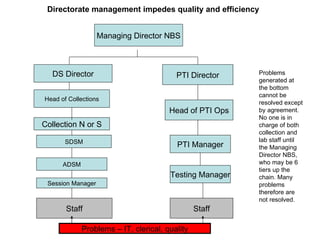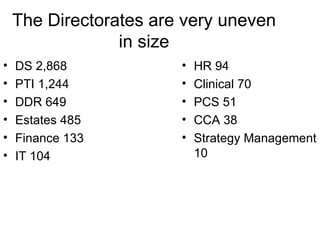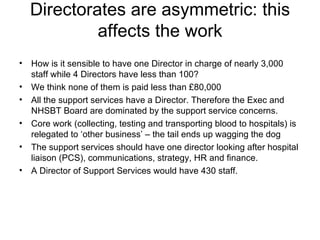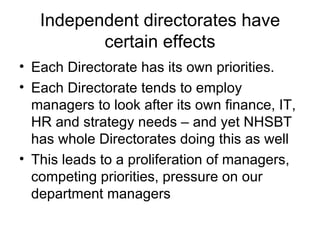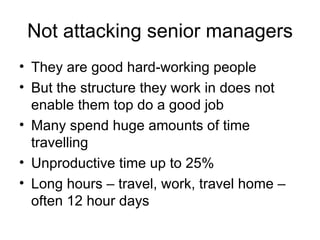Dysfunctional management
- 1. Ėý
- 2. Up to 8 Directorates at each Blood Centre No single person in charge of all at one site â they work independently, in consultation only DS 2,868 PTI 1,244 DDR 649 Estates 485 Finance 133 IT 133 HR 94 Clinical 70 PCS 51 CCA 38 Strategy Management 10 A typical Blood Centre DS PTI DDR EST FIN IT HR CLIN
- 3. Staff Staff Session Manager Testing Manager ADSM Head of Collections DS Director PTI Manager Head of PTI Ops PTI Director Managing Director NBS SDSM Collection N or S Problems â IT, clerical, technical, quality Directorate management impedes quality and efficiency Problems â IT, clerical, quality Problems generated at the bottom cannot be resolved except by agreement. No one is in charge of both collection and lab staff until the Managing Director NBS, who may be 6 tiers up the chain. Many problems therefore are not resolved.
- 4. The Directorates are very uneven in size DS 2,868 PTI 1,244 DDR 649 Estates 485 Finance 133 IT 104 HR 94 Clinical 70 PCS 51 CCA 38 Strategy Management 10
- 5. Directorates are asymmetric: this affects the work How is it sensible to have one Director in charge of nearly 3,000 staff while 4 Directors have less than 100? We think none of them is paid less than ÂĢ80,000 All the support services have a Director. Therefore the Exec and NHSBT Board are dominated by the support service concerns. Core work (collecting, testing and transporting blood to hospitals) is relegated to âother businessâ â the tail ends up wagging the dog The support services should have one director looking after hospital liaison (PCS), communications, strategy, HR and finance. A Director of Support Services would have 430 staff.
- 6. Independent directorates have certain effects Each Directorate has its own priorities. Each Directorate tends to employ managers to look after its own finance, IT, HR and strategy needs â and yet NHSBT has whole Directorates doing this as well This leads to a proliferation of managers, competing priorities, pressure on our department managers
- 7. NBS department managers In many ways the hardest job in the organisation Caught between alienated staff and harsh reality and strategic and theoretical plans Support Directorates have devolved more and more work to line managers â HR, finance, admin. They rarely have clerical support or a deputy Deputies are frowned on â except for Directors! Little input to policy, just execute policy set by others
- 8. Staff Are staff alienated? Staff survey says yes. Baffled by many national initiatives Some initiatives are not well-grounded in real world Difficult or impossible to modify national policy, even on simple operational matters But still motivated to provide service to patients and donors But this is despite senior management Senior management is supposed to assist and facilitate daily work
- 9. Not attacking senior managers They are good hard-working people But the structure they work in does not enable them top do a good job Many spend huge amounts of time travelling Unproductive time up to 25% Long hours â travel, work, travel home â often 12 hour days
- 10. Not whinging - We have good positive suggestions End directorate management Merge support services into one directorate Each Centre to have a Director with authority over all departments Leave department managers to run their departments â HR and finance to take back their work


